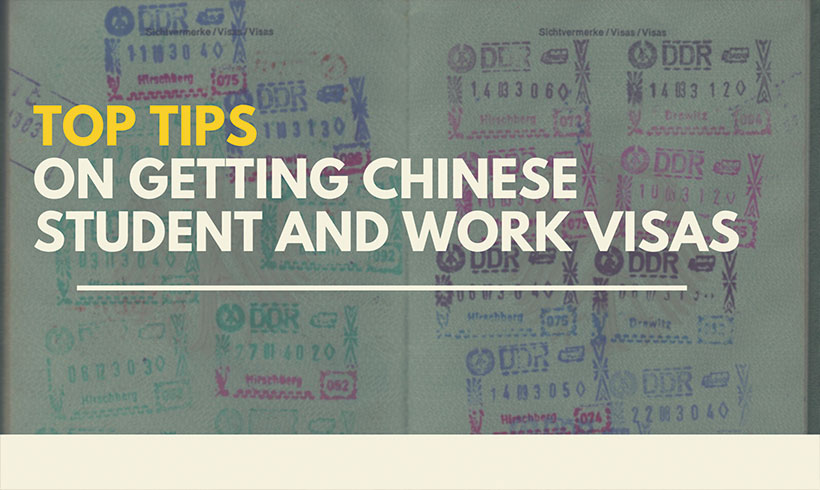So you’ve decided to come to China. The next step is to find out how to obtain a Chinese visa to enter and stay in the country legally. In this article, we will discuss two types of Chinese visas, namely the Student Visa and the Work Visa. Here’s Top Tips on Getting the Chinese Student and Work Visas.

The Chinese Student Visa
Which type of visa should I apply for?
The type of visa you apply for will depend on your purpose of visit. For short-term travelers or students, i.e. 30 days or less, the tourist visa is the easiest to apply for. Those planning to stay longer in China must apply for the student X visa.What Is X Visa?
The Chinese student visa (X visa) is split into two categories: X1 and X2. The main difference between the two is the number of entries permitted and the duration of stay.
-
X1 Visa
The X1 visa is a multiple entry visas which allows students to stay in China for more than 180 days (usually up to a year). You can enter and exit China as many times as you wish within the period of validity of the visa.
-
X2 Visa
The X2 visa is a single entry visa issued to those who will stay in China for less than 180 days. The duration of stay depends on the length of your study program.
Good To Know:
Although the regular visa processing time takes only about a week, it’s best to apply two to three months in advance, before your study program starts. This will give you ample time to search for and purchase a cheaper flight ticket. Flight tickets tend to be more expensive when purchased close to the flight date.How Can I Obtain A China Student Visa?
The easiest way is to sign up for the Chinese Visa Program at That’s Mandarin. This program is created for foreigners who want to experience the Chinese culture, travel within China and study Chinese at the same time. It’s a program designed to make it easier for you to reach your Chinese goals.
You can choose to study in Beijing or Shanghai. Both are modern cities with its own unique identities, infused with the traditional history of ancient China. The choice is yours.
-
BEIJING
If you are into Chinese culture and want to have a taste of authentic Mandarin Chinese, then Beijing can be the ideal choice for you as it’s not only the capital but also the cultural and political center of China. More importantly, the modern standard Chinese has developed based on Beijing dialect.
-
SHANGHAI
If you are looking for fascinating job opportunities and would like to live in a modern area surrounded by skyscrapers, then Shanghai is your destination. Being the financial center of China, Shanghai offers numerous job opportunities for both Chinese and foreigners. At the end of 2015, the amount of “non-Shanghainese” took up to 40% of the total population of Shanghai.
How Do I Apply For The Chinese Visa Program?
Go to our Chinese Visa Program page to find more info about the course and to apply.
Why Should I Join That’s Mandarin?
You can get many benefits by joining That’s Mandarin. Not only are our courses competitively priced, we also offer great returns on your investment.-
Small Group Classes
In this program, you will be studying in a group class of 2 to 5 students only. The small group size is meant to provide a high-quality learning environment, where each student has the opportunity to be involved in each activity in the class. The teachers can also monitor each student’s learning progress and adjust the lesson content and style as necessary.
-
Effective Teaching Methods
We developed our own teaching methods that have been proven to be very effective in improving students’ Chinese skills and making Chinese lessons more enjoyable and less daunting. Our former students claimed that they learned more in two weeks with us than 2 months at other schools!
-
The Social Aspect
Students who choose to study in small-group classes will certainly have more chance to practice Chinese by interacting with other classmates and the teacher and therefore quickly improve their Chinese language skills. We also organize cultural events every month to bring all students together.
-
Central Location
Our schools in Beijing and Shanghai are both centrally located in the heart of the downtown areas. You can access shops, restaurants, banks, and almost everything else within a short walking distance.
-
After-sales Service
Did you know that we take pride in our customer service? Our staff and teachers care about our students. We make sure that you’re taken care of before you join our school, while you’re here and even after you’ve completed your program with us.
The Chinese Work Visa
Currently, if you want to work in China, of course, you will need a Chinese work visa. there are two types of work permits you can apply for: an employment license for foreigners from the Ministry of Human Resources and Social Security. Or a foreign expert work permit from the State Administration of Foreign Experts Affairs (SAFEA). The system has always been a bit confusing, what with figuring out who is a foreign expert and who is not. The pilot scheme, which unifies two work permits required by foreigners to just one, currently covers Beijing, Tianjin, Hebei, Shanghai, Anhui, Shandong, Guangdong, Sichuan, and Ningxia, from October 2016 to March 2017.
China Work Visa Categories
The Bureau has explained that it will allocate foreigners applying for a Chinese work visa into 3 distinct categories: A (top talent), B (professional talent), and C (unskilled workers or those working the service industry). While a “green channel” in applying for a work visa will be opened to those A-graded individuals. The B and C categories of expats will be limited by the government.
The newspaper, the Global Times explains that foreigners will be given points based on their salary in China, their educational background. How long they’ve worked in China, their Chinese language proficiency. Their age, and where they work (you’ll get more points for working in less developed regions). 85 points or higher? You get an A, congratulations, you’re one of the good ones! Only 60 points or higher? Still, have some work to do. Under 60 points? Sorry, you’re a C-level talent.
Foreign graduates with master’s degree don’t need work experience for the China work visa
International graduates with master’s degrees from Chinese universities. Or “well-known” foreign universities (which universities qualify as “well-known” is not yet known). Are now eligible for a Z visa (Chinese Work Visa) immediately after graduation. Waiving the previous requirement of two years of postgraduate work experience. According to an announcement from the Ministry of Human Resources and Social Security (MOHRSS).
China Visa requirements:
- At least 18 years old and in good health.
- Have a clean criminal record.
- Excellent academic performance, with an average grade of 80% or above B/ B+ and a good behavioral record.
- Obtained a relevant degree and educational background.
- Have a confirmed job offer in China relevant to your degree major, with a higher salary than the local average (as determined by the local social security department).
- Possess a valid passport or equivalent.
China Z Visa requirements:
- Proof of employment history.
- Letter proving the employment offer and remuneration.
- Report giving evidence that the company advertised the job to domestic workers for at least 30 days.
- Proof of health status.
- Criminal record check.
- Degree certificate and transcript.
- Record of good behavior and grades during education (not required if the applicant has already graduated).
- A photo was taken within the last six months.
- Employment license or foreign expert work permit, obtained from the Human Resources and Social Security Department or Management or State Administration of Foreign Experts Affairs.

China wants more Foreign Workers
China plans to relax visa policies and make it easier for foreigners to qualify for permanent residence in a bid to attract overseas talent and investment. According to CCTV, as well as making it easier to settle in China, the government plans to expand the social security system to cover foreigner. Granting them the same retirement, unemployment, medical and maternity benefits enjoyed by Chinese citizens.
Between 2011 and 2015, 3 million foreign “experts” began working in China, an increase of 30 percent over the preceding five years according to official statistics. The Chinese Foreign Ministry said that China would work towards “creating a favorable environment for foreign companies and protecting the legal rights of foreign investors.”
Whatever your profession, China is increasingly opening up to foreigners. Over the last few years, there has been an influx of people coming to China to seek pastures new. Though the Chinese work visa seems to change every year or two, sometimes with more red tape, sometimes less. So keep yourself updated about the situation. If you need any more advice or help let us at That’s Mandarin know!











0 Comments